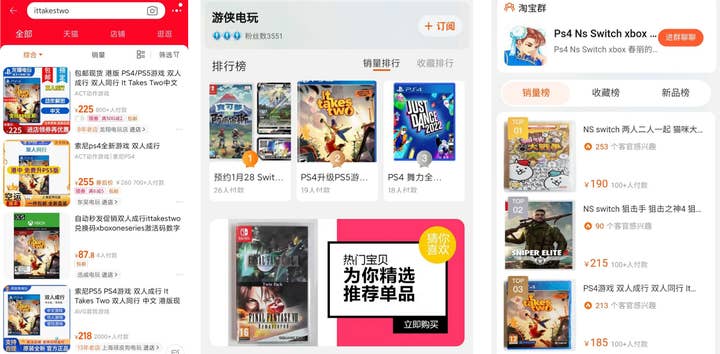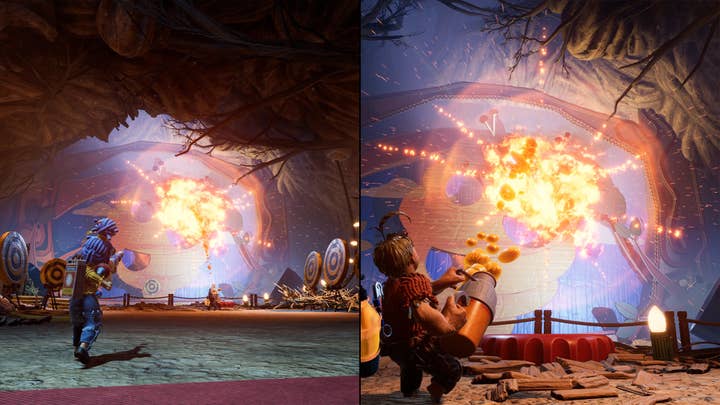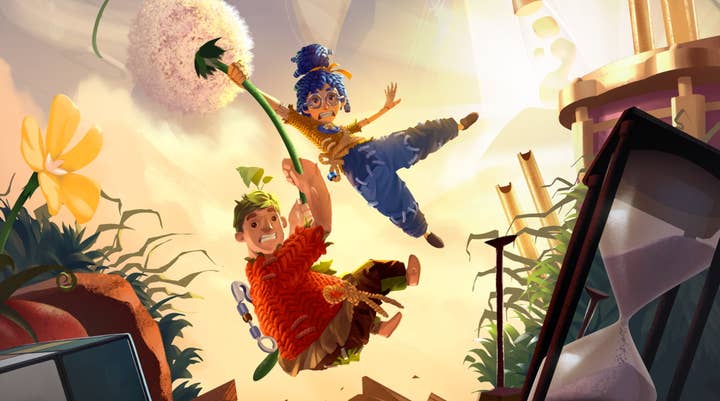How It Takes Two became China's Game of the Year (without even being released)
Daniel Camilo dives into how unlicensed titles achieve success in the world's biggest gaming market
It Takes Two won Game of the Year 2021 at the Bilibili Game Awards in China. Which is impressive, given that the game isn't even officially available in the country.
The critically-acclaimed co-op title from Hazelight Studios does not have a publishing license in China, necessary for a game to be commercially (and legally) distributed in the Chinese market. And yet, it has been immensely popular in the territory since release.
Let's try to unravel and understand this apparent conundrum...
What are the Bilibili Game Awards?
Bilibili (say it 10 times!) is a major video and streaming platform mostly popular and used in China. Think of it as a mix of YouTube, Twitch and TikTok. Among other features, people commonly use Bilibili's services to stream movies and TV shows, as well as to watch gaming streams. Due to its popularity, Bilibili is often where a lot of Chinese consumers see and learn about new games.

On January 8th, the company held its annual Game Awards, with It Takes Two taking the grand prize for Game of the Year. At this point it should come as no surprise that the co-op adventure game continues to win GOTY awards, as it already won game of the year at The Game Awards (USA), and was included in many end-of-the-year lists from several different outlets. Also, my personal GOTY.
How can a game be available and popular in China if it hasn't been published?
There's a lot to unpack here in order to understand the dynamics of the Chinese gaming market -- in particular when it comes to console and PC games -- as is the case with It Takes Two.
For a premium game (as in, not free-to-play) to be legally distributed and commercialized in mainland China (excluding Hong Kong and Macau), it is required to have a publishing license (ISBN) and IP certificate approved by local regulators. It Takes Two doesn't have either, currently. The process to acquire such documents is usually triggered by the game's developers, who are required to have a local publishing partner in order to launch their game in China. Presumably, neither Hazelight Studios nor Electronic Arts attempted to have its game published in China, that I know of.
It Takes Two's themes of family, love and divorce might have resonated with Chinese audiences more than the average AAA shooter
Back in 2020, Animal Crossing New Horizons was one such case as well, with the game becoming hugely popular in China despite not having a legitimate version launched. Unlike Animal Crossing, however, It Takes Two is not banned in China. It's important to make this distinction, as a game not having a publishing license doesn't make it necessary banned, like Animal Crossing is.
Due to the ambiguous and loophole-prone nature of many Chinese laws and regulations, the legal status of a game like It Takes Two in China is hard to discern exactly. And if this seems to contradict what was written in the previous paragraph... well, that's China. Regulations and what is actually practiced don't always align in a clear and linear way.
Everything is allowed, even if it's not
In practice, the game is widely and easily available on e-commerce platforms through imported physical copies for its console versions, as well as digitally for PC and consoles in their respective online stores. Anyone in China can very easily browse Taobao (China's biggest e-commerce platform) and pick up a copy of It Takes Two for the PS4, PS5, or Xbox consoles. Online sellers have imported copies of virtually any modern game you can think of, making them effectively available to Chinese consumers.

Due to the "grey zone" in which these unlicensed games find themselves in, streaming platforms like Bilibili have no issues in distributing content that features said games, like It Takes Two (although Bilibili in particular seems to be cracking down on some of the content streamed). Entire playthroughs of games that would never stand a chance of being approved for a publishing license (due to their 'sensitive' content) are/were being streamed on a multitude of different online platforms.
China is actively inflating sales for other markets, while simultaneously and inadvertently keeping its own real influence obscured
This allows for 'risky' games like The Last Of Us Part 2, Grand Theft Auto 5, Call of Duty and, yes, It Takes Two to have huge advertising platforms for their games in China, potentially reaching millions of viewers. At the same time, developers and international publishers for those games are not spending a dime on marketing in China, and their titles can become overnight hits through word of mouth alone.
Arguably, sometimes it makes more business sense to not even try to officially launch a (foreign) game in China. An officially licensed console title requires a lengthy approval process that can take up to a year or more to be concluded (if it ever does), plus full localization to Chinese and editing/removal of sensitive content (if any) -- with the associated development costs that comes from making changes.
If all that is done, you'll have a region-locked game that will only work on the Chinese models of their respective consoles. The officially licensed consoles (Chinese versions of the PS4, PS5, Xbox Series X|S, Xbox One and Switch) available in the Chinese market are region locked, which is why imported models far outsell the licensed ones (yes, imported consoles are also widely available for purchase online).
Why is It takes Two popular in China?
From outside observers, there's a general tendency to try to "explain" China, as if it requires a different approach and rationale from any other place on Earth. While it's true that China can be very unique, and most definitely requires a deep contextual understanding when examined in depth, I'm inclined to suggest that in this case the answer is quite simple: It Takes Two is a very good game.
Being good doesn't automatically and necessarily makes a games successful. We know that all too well. But a good game is good no matter where you are in the world, and for It Takes Two in particular, its themes of family, love and divorce might have resonated with Chinese audiences more than the average AAA shooter (divorce rates in China have been soaring for the past two decades).

Also, it's a co-op game, making it more convivial than most other games, making it perhaps more attractive for the general Chinese household where commonly up to three different generations live together. Being a fairly easy-to-play platforming game, coupled with the power of viral video clips from the aforementioned streaming platforms likely contributed for a wider popularization of the game, even among those who are not seasoned gamers. Ultimately though, it's a good game, and that in itself is the best it got going for it.
How many copies sold in China?
The short and most accurate answer is: nobody knows exactly. But we did get some insight from Josef Fares recently, as he claimed during a podcast with Tim Schafer that "almost half of our player-base is in China." That, coupled with last year's news that the game sold over three million copies worldwide, seems to indicate It Takes Two moved at the very least one million copies in China alone (by conservative and cautious estimates), making it the biggest single market for the game.
Still, it is virtually impossible to know exactly how many copies -- physical and digital -- of the game were acquired by consumers in China. As mentioned, all physical copies are imported from other markets, and digital copies would have been acquired from digital stores set to different regions other than China. These copies are sold throughout hundreds of online stores and even some "grey market" physical locations all over the country, with no one actively tracking all these shipments, where they come from, or in what proportion.
What we do know is that these copies are ultimately being accounted as sales in other markets, which in turn makes it very difficult to really understand how much China truly influences global sales for international games. If one million units of It Takes Two were distributed and sold in China, all those copies had to come from either Japan, Hong-Kong, Taiwan, Europe, USA or other regions.
China is actively inflating sales for other markets, while simultaneously and inadvertently keeping its own real influence obscured. This happens for It Takes Two, but also for any other unlicensed games sold in China at any given moment.
Daniel Camilo lives in Shenzhen. He is a games publishing business developer and analysts who previously worked at Apptutti, a specialist in publishing games in China
